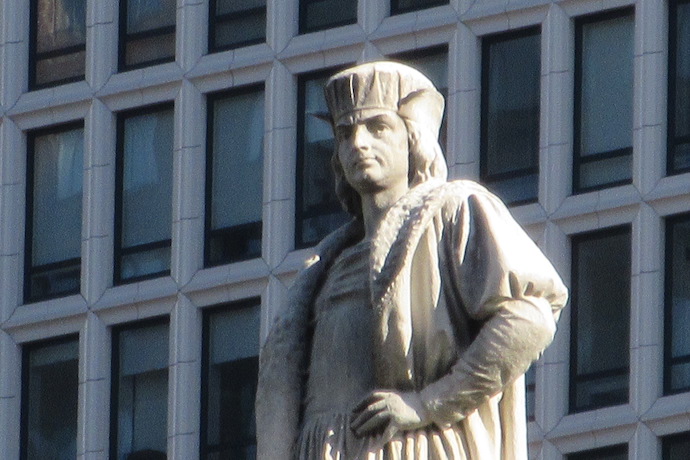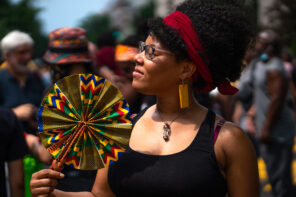Note: For readers directed here by the newsletter, we apologize for the incorrect link. Read How U.S. Conservatives Conjured the Jesus of Their Dreams here. — eds
With less than a month before the election, Donald Trump has once again turned to a faithful weapon in his arsenal, white nationalism. In this year’s Columbus Day Proclamation, the White House added some pointed commentary regarding both Christopher Columbus and Trump’s place in U.S History and as symbols of western civilization.
The Trump administration Columbus Day Proclamation served to tout its assault on recent attempts to rectify and remove the history of white supremacy commemorated through public monuments as well as his recent deceptively titled executive orders banning anti-racism and diversity training by federal agencies and contractors. The proclamation labeled individuals who combat racism and white nationalist extremism as “radical activists” and reiterated his call for “patriotic” education through the establishment of the 1776 Commission. The Proclamation includes the following condemnation:
“Sadly, in recent years, radical activists have sought to undermine Christopher Columbus’s legacy. These extremists seek to replace discussion of his vast contributions with talk of failings, his discoveries with atrocities, and his achievements with transgressions. Rather than learn from our history, this radical ideology and its adherents seek to revise it, deprive it of any splendor, and mark it as inherently sinister. They seek to squash any dissent from their orthodoxy. We must not give in to these tactics or consent to such a bleak view of our history. We must teach future generations about our storied heritage, starting with the protection of monuments to our intrepid heroes like Columbus.”
To fully grasp how much of a departure this proclamation was from previous years one should compare this most recent proclamation with the previous one. The 2019 Columbus Day Proclamation followed the general pattern laid out by his predecessors except for the glaring omission of the effects that the Columbian voyages had on indigenous people of this hemisphere. Consider the 2016 Columbus Day Proclamation in Barack Obama’s final year in office that includes the following comments:
“As we mark this rich history, we must also acknowledge the pain and suffering reflected in the stories of Native Americans who had long resided on this land prior to the arrival of European newcomers. The past we share is marked by too many broken promises, as well as violence, deprivation, and disease. It is a history that we must recognize as we seek to build a brighter future—side by side and with cooperation and mutual respect. We have made great progress together in recent years, and we will keep striving to maintain strong nation-to-nation relationships, strengthen tribal sovereignty, and help all our communities thrive.”
This year’s proclamation omitted any reference to the violence inflicted upon Native Americans, instead calling such focus “revisionist history” meant to “erase Christopher Columbus from our national heritage.” In a year filled with much angst over America’s public memory primarily through the removal of Confederate statues throughout the country, it wasn’t long before the symbolism of Columbus was again front and center in the battle over the meaning of America’s origin myths.
Taking this as an opportunity Trump has once again positioned himself in the “defender” role. Whether he portrays himself as the “defender of western civilization,” “defender of the Christian,” or even his continued defense of white supremacist groups, Trump’s penchant for casting himself as the messianic savior of whiteness allows him to remain beloved by his most ardent supporters and play upon their anxieties over a changing demographic landscape.
In other words, Trump has turned the Jay-Z line, “I’m anti-Santa Maria. Only Christopher we acknowledge is Wallace”—a posthumous toast to his one-time friend The Notorious B.I.G.—on its head through his Columbus Day proclamation in which he declared on behalf of his supporters that the ‘only Christopher they acknowledge is Columbus.’
Columbus’ elevation into the heroic pantheon within American society is worth considering. Through the advocacy of the Knights of Columbus, a Catholic charity that aided newly arriving immigrants, Columbus Day has its roots in San Francisco’s Italian-American community in which Columbus Day coincided with the celebration of Italian-American heritage. But why Columbus? Were there not innumerable Italian Americans who would be more fitting (and less problematic) to symbolize Italian-American contributions to American society than an individual who never actually set foot in what is now the United States?
Whether it’s the school-age yarn about proving the world wasn’t flat, or the daring and brave explorer setting out to find an alternate route to Asia for spices, to the more complex and unsympathetic readings, Columbus as origin myth is a Rorschach test in which Americans see either the America they want to “make great again” or the America they want to see live up to its promises.
Italian Americans’ embrace of Columbus during the early 20th century can be tied to their quest to assimilate into the largely hostile white Protestant society that marginalized European Catholics. By asserting Columbian primacy over America’s origin myth, it allowed for the consolidation of Catholic and Protestant whiteness in the form of a dual myth of national origins.
America’s struggle with its national myths is perhaps most conflicted around the two origin myths. The arrival of Columbus in 1492 in the Bahamas and the arrival of the Pilgrims in 1620 at Plymouth (and the subsequent First Thanksgiving) serve as dual origin myths of the American settler colonial project.
If we compare the Columbus Day-Thanksgiving couplet to the two biblical creation narratives contained in Genesis chapters 1-2 we get a similar macro-versus-micro-level perspective. Columbus emerges as the macro level event that sets the stage for the emergence of the New World, which in the Eurocentric perspective is creatio ex nihilo (created out of nothing) in which the native populations and their respective cultures are the treated like the tohu va’bohu (without form and void) in Genesis 1:2 that’s in need of ordering and fashioning by the invading European Christian conquistadors.
Whereas Thanksgiving’s leapfrogging of the Jamestown colony in terms of mythic importance lies in its ability to, on a micro level, draw upon notions of divine election, chosenness, and American exceptionalism. These settler colony origin myths explain how the chosen peoples of America are destined for greatness; its Manifest Destiny.
This also explains why the suggested replacement of Columbus Day with Indigenous Peoples’ Day faces an uphill battle. In 1977 indigenous leaders from around the world organized a United Nations conference to promote indigenous sovereignty and self-determination. Their first recommendation was “to observe October 12, the day of so-called ‘discovery’ of America, as an International Day of Solidarity with the Indigenous Peoples of the Americas.”
Within the United States, the Colorado branch of the American Indian Movement (AIM) would, in the 1980s, propose Indigenous Peoples’ Day, and Berkley, California would celebrate its first Indigenous Peoples’ Day in 1992, (the 500th anniversary of the Columbian voyage). Versions of Native American or Indigenous Peoples’ Day have been proposed as a replacement for Columbus Day for three decades, more recently by states and municipalities throughout the country. It would take 30 years before the United Nations formally recognized the Declaration on the Rights of Indigenous Peoples, which was adopted in September 2007.
However, in terms of its American civil religion potential, re-designating Columbus Day nationally as Indigenous Peoples’ Day—shifting focus from the narrative of discovery to the narrative of invasion and dispossession—calls into question the legitimacy of the American experience.
As a comparison, imagine halfway through the conquest of Canaan narrative the Biblical writer’s perspective shifts from that of the Israelites and their conquest of the Promised Land to that of the Canaanites viewing the oncoming Israelite marauders as signaling the end of their way of life. While this would work well for a social justice version of the Bible, it disrupts the notion of a chosen people that’s central not only to the biblical narrative but also to the idea of American exceptionalism. Therefore, for Indigenous Peoples’ Day and other alternatives to successfully work, white Americans must come to terms with the idea that their national origin myths are coupled to a white supremacist project that white identity relies on for its existence.
Origin myths are often employed as justifications for the world as it is. The continued call for the replacement or removal of Columbus Day in favor of Indigenous Peoples’ Day by Native American activists and their allies doesn’t change the world that these myths signify.
While serving as valid critiques of historical atrocities, counter-observances, such as Indigenous Peoples’ Day or the National Day of Mourning on Thanksgiving, do not dismantle the world of white supremacy. Simply banishing the mythos (symbolism) of white supremacy while leaving the logos (the factual and lived world) of white supremacy ensures the survival of the system and the creation of new myths in its place.





